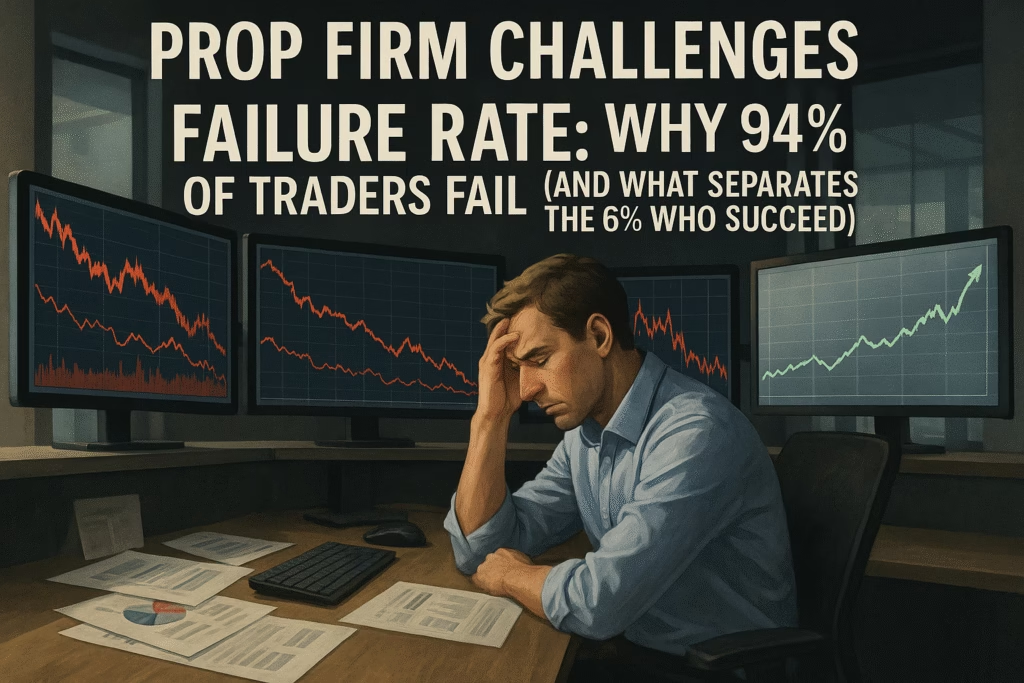Prop firm challenges failure rate is one of the most discussed topics among retail traders today. Proprietary trading firms have grown rapidly in the past few years, offering retail traders access to large amounts of capital if they can pass strict evaluation challenges. On paper, this looks like the perfect opportunity: instead of risking personal funds, a trader can prove their skills and get funded.
But behind the marketing, the reality is much tougher. Recent studies analyzing over 300,000 trading accounts and Reddit discussions show that 94% of traders fail their first prop firm challenge, and only 7% ever receive payouts. With numbers like these, the question isn’t just why do traders fail, but also what makes the successful few stand out?
The Rise of Prop Firm Challenges
Prop firms gained popularity as an alternative to traditional trading paths. Instead of raising capital through personal savings or investors, traders can now attempt a structured “challenge” with clear rules: achieve profit targets without breaching drawdown or risk limits.
This model appeals to ambitious retail traders, but it also introduces unique pressures. Unlike normal trading accounts, prop firm challenges often include strict rules around daily losses, consistency, and maximum leverage. These additional constraints, combined with psychological pressure, explain much of the high failure rate.
The Harsh Reality of Prop Firm Challenges
The numbers speak for themselves:
- 94% of traders fail their first evaluation
- Only 7% of traders ever receive payouts
- 92% report technical issues, such as non-market prices, slippage, or platform failures
- 85% believe risk management is the most critical success factor
This data shows that prop firm challenges are less about fast profits and more about proving discipline. Passing requires a mindset shift: traders must treat the challenge as a professional evaluation, not a lottery ticket.
Why Most Traders Fail Prop Firm Challenges
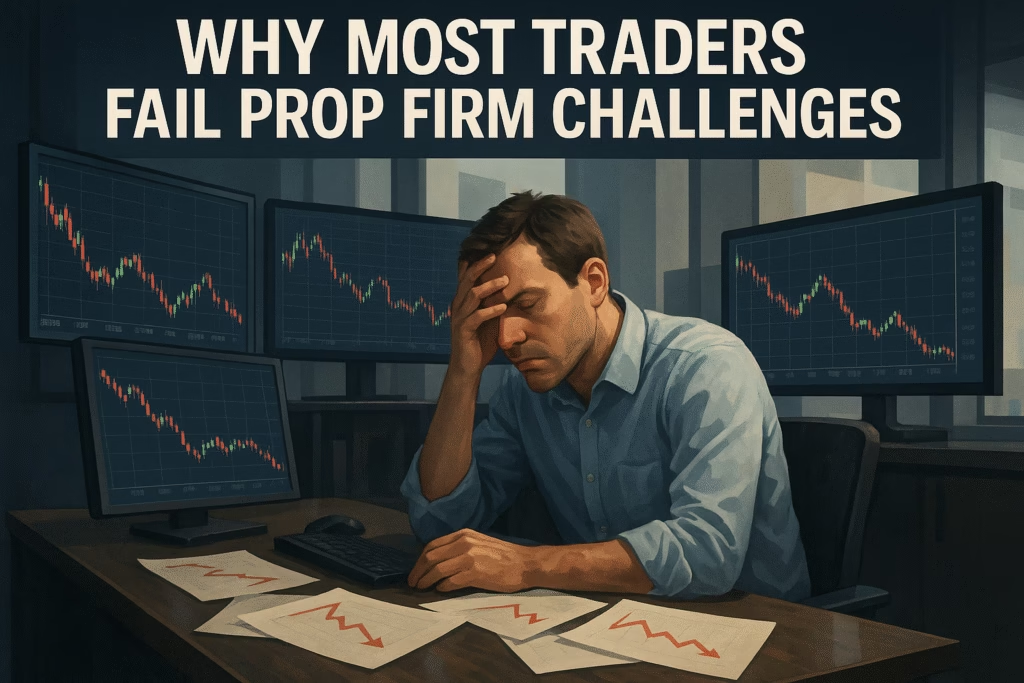
1. Lack of Risk Management
Poor risk management is the single largest contributor to the prop firm challenges failure rate. Many traders risk too much on a single trade, ignore drawdown limits, or chase losses after setbacks. Prop firms design their rules to eliminate undisciplined strategies quickly.
Solution: adopt strict position sizing, limit risk per trade (0.5–1% of capital), and focus on long-term consistency.
2. Technical Problems Beyond Trader Control
Even skilled traders struggle with technical issues. Data shows that 92% of traders experience execution delays, spread widening during volatile news, or suspicious price feeds. These factors can undermine even the best strategies.
Solution: test platforms thoroughly on demo, avoid trading during known high-volatility periods unless prepared, and keep detailed records of trades to resolve disputes if needed.
3. Emotional and Psychological Pressure
Challenges are designed to be difficult—89% of traders describe them as stressful. The pressure of evaluation fees, combined with strict rules, causes many traders to abandon their strategy and take impulsive trades.
Solution: build psychological resilience. Approach challenges as if trading live capital, maintain patience, and avoid emotional decisions after losses.
What Separates the 6% Who Succeed?

The minority of traders who succeed at prop firm challenges share common traits. Their edge isn’t secret strategies or insider knowledge—it’s discipline and preparation. Key success factors include:
- Risk management discipline (strict position sizing, drawdown awareness)
- Deep understanding of challenge rules (profit targets, daily limits, news restrictions)
- Consistent strategy execution (no over-leveraging, no chasing losses)
- Adequate preparation through demo trading and backtesting
- Emotional control to withstand the pressure of strict evaluation
These factors explain why risk management is cited by 85% of traders as the most important skill for passing challenges.
Prop Firm Comparisons Without Rankings
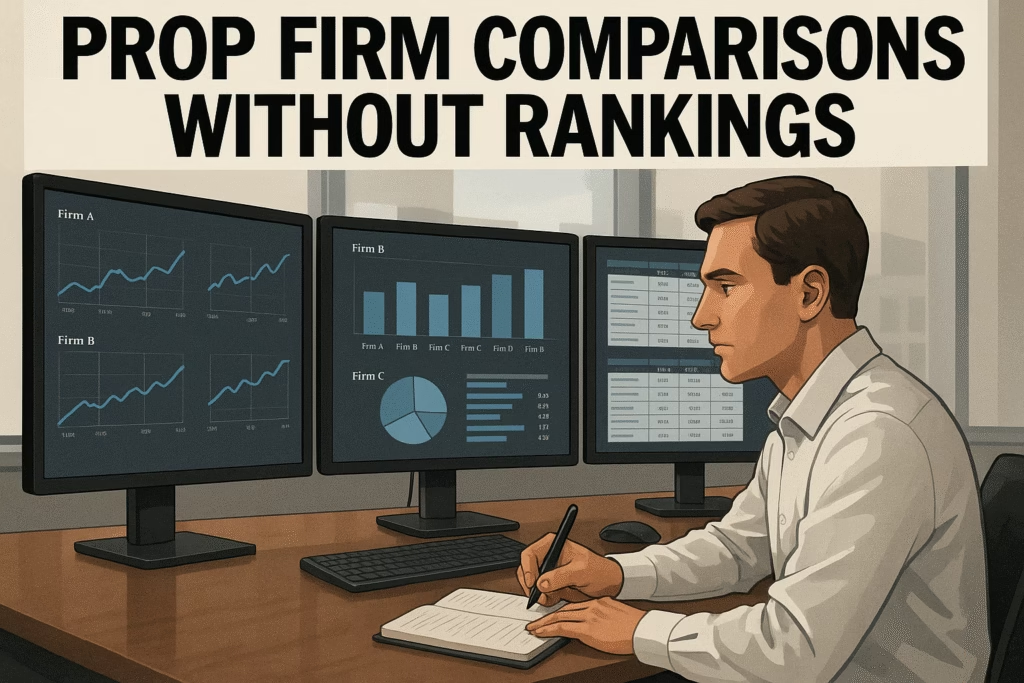
While many traders look for “the best prop firms,” the truth is that firms differ in execution quality, rule transparency, and payout reliability. Instead of chasing lists or rankings, traders should evaluate firms using measurable criteria:
- Proven payout history
- Transparent rules and fair contracts
- Stable trading platforms with minimal downtime
- Positive community reputation and feedback
The right prop firm is the one that matches a trader’s style and offers conditions they can rely on—not necessarily the one with the loudest marketing.
Improving Your Odds Against the Prop Firm Challenges Failure Rate
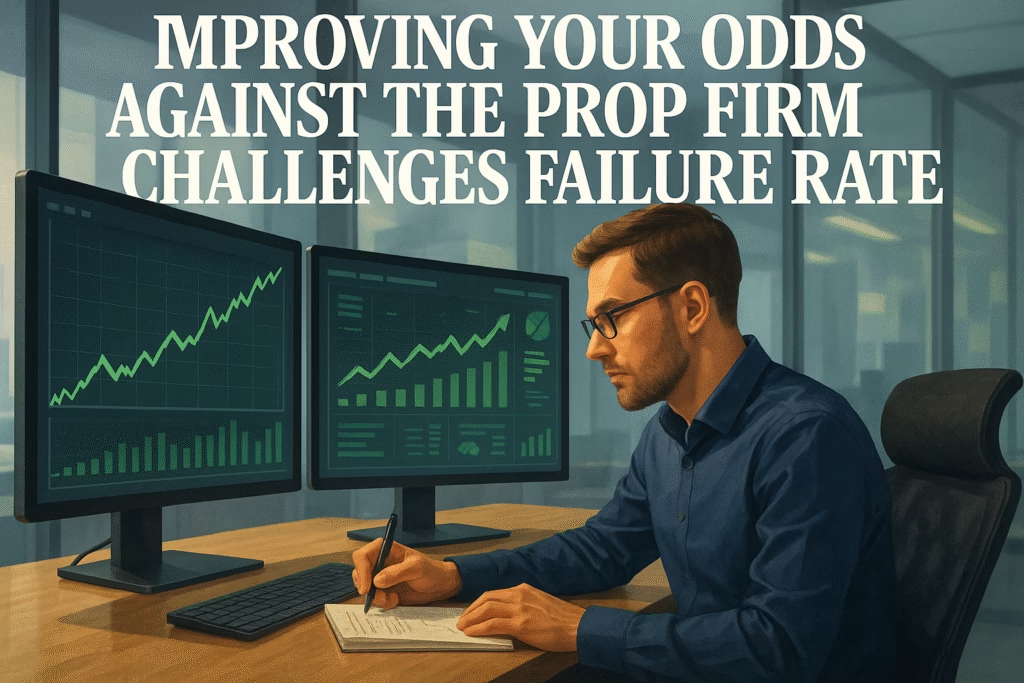
To improve success rates, traders must shift their focus from short-term profits to long-term discipline. A practical checklist includes:
- Create a written risk management plan before starting any challenge
- Simulate prop firm rules in a demo account before going live
- Track every trade to identify weak spots in execution or discipline
- Develop psychological routines such as journaling or pre-trade checklists to reduce emotional mistakes
- Stay realistic—passing one challenge does not guarantee payouts; consistent performance over time matters most
Final Thoughts
The prop firm challenges failure rate of 94% is not a reason to avoid proprietary trading it’s a reminder of the discipline required to succeed. Most traders fail because they underestimate the difficulty, ignore risk management, and lose emotional control under pressure.
The good news is that the data also shows a clear roadmap to success. Traders who respect the rules, manage risk with precision, and prepare thoroughly can join the 6% who prove themselves and achieve funding.
Success in funded trading isn’t about beating the market it’s about proving you can survive in the toughest trading environment designed to filter out the unprepared.
Automate Your Trading with PickMyTrade
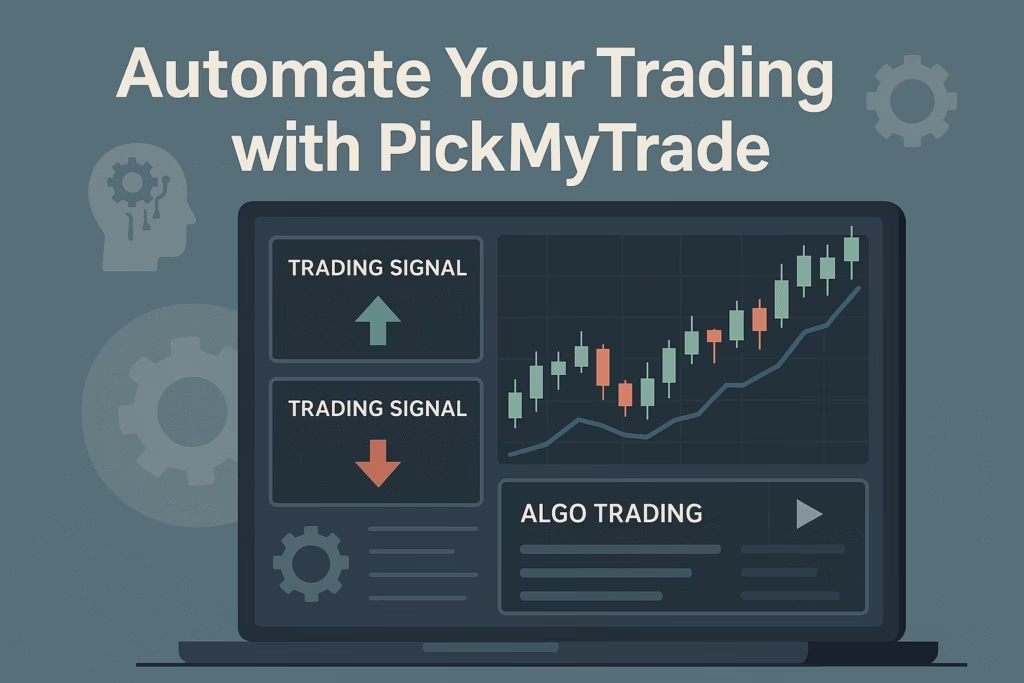
For traders looking to automate trading strategies, PickMyTrade offers seamless integrations with multiple platforms. You can connect Rithmic, Interactive Brokers, TradeStation, TradeLocker, or ProjectX through pickmytrade.io.
If your focus is Tradovate automation, use pickmytrade.trade for a dedicated, fully integrated experience. These integrations allow traders to execute strategies automatically, manage risk efficiently, and monitor trades with minimal manual intervention.
You May also Like:
- How to Use GPT-5 with TradingView Strategies for Automated Trading
- Top Free Indicators and Strategies on TradingView
- Best TradingView Indicators and Strategies: Free and Premium Tools for All Traders
- Prop Firms Using Tradovate Broker: The 2025 Comparison Guide
- Instant Funding or Evaluation Challenge: The Better Path for Traders in 2025
- Prop Firm Payouts 2025
- Prop Firm Red Flags: 5 Warnings Traders Must Know
- Drawdown Limits in Prop Trading: Risks and Risk Management Strategies
1. What is the average prop firm challenges failure rate?
The average prop firm challenges failure rate is around 94%, meaning most traders do not pass their first evaluation. Only about 6–7% of traders succeed and receive funding. This high failure rate is due to strict risk management rules, technical issues, and psychological pressure.
2. Why do so many traders fail prop firm challenges?
Traders fail mainly because of poor risk management, emotional decisions under pressure, and technical problems beyond their control. Ignoring drawdown limits, over-leveraging, or failing to follow challenge rules also significantly increases the prop firm challenges failure rate.
3. What separates the traders who succeed?
Successful traders share traits like strict risk management, consistent strategy execution, clear understanding of challenge rules, and emotional discipline. They focus on long-term consistency rather than quick profits, which gives them an edge over 94% of traders who fail.
4. How can I improve my odds of passing a prop firm challenge?
To improve success rates:
Choose a prop firm with a transparent payout history and reliable platform
Develop a risk management plan before starting
Practice the challenge rules in a demo account
Track every trade to spot mistakes
Maintain emotional control and discipline
5. Do technical issues affect the prop firm challenges failure rate?
Yes. Technical problems such as slippage, execution delays, and unstable platforms affect over 90% of traders during challenges. Choosing a prop firm with a reliable trading platform and fair execution policies can help mitigate these risks.
6. Are some prop firms better than others?
Instead of chasing rankings, evaluate firms based on:
- Transparent rules and fair contracts
- Proven payout history
- Stable and reliable trading platforms
- Positive community reputation
The “best” prop firm is the one that fits your trading style and risk tolerance, not necessarily the most popular or heavily advertised.
7. Can anyone pass a prop firm challenge with the right strategy?
Yes, but passing requires more than a good trading strategy. Success is determined by discipline, preparation, risk management, and emotional resilience. Even the best strategy can fail without proper execution under the strict rules of a prop firm challenge.

